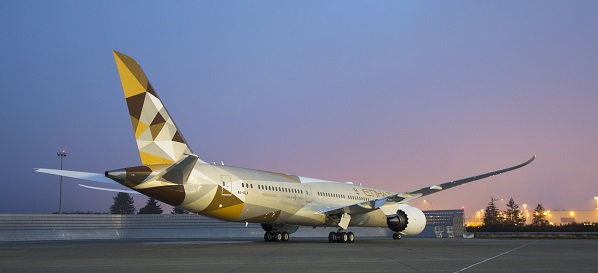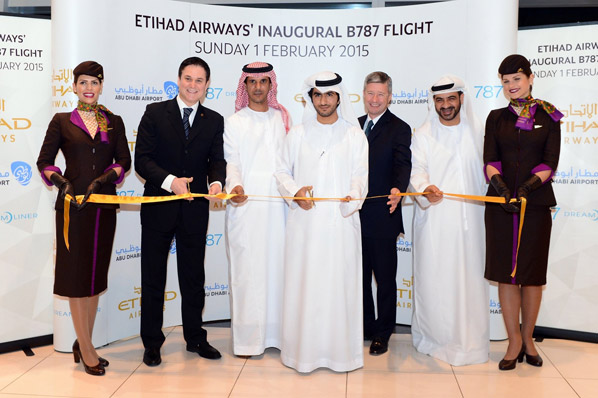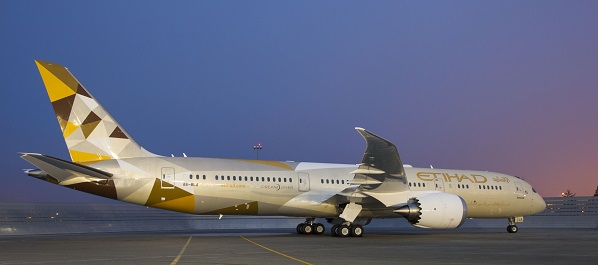Etihad Airways welcomes Dreamliner to fleet as passenger numbers soar

Etihad Airways, the national airline of the United Arab Emirates, has introduced its first Boeing 787 Dreamliner into commercial service.
The first flight, operated by a Boeing 787-9, departed Abu Dhabi at 02:15 as flight EY23 for the seven hour 25 minute flight to Düsseldorf, Germany.
The flight arrived at 06:40 the same morning.
The return service from Düsseldorf to Abu Dhabi departed at 10:20 with a scheduled arrival time of 19:50 back in Abu Dhabi.
A ribbon-cutting ceremony was held at the departure gate to mark the occasion, attended on behalf of Etihad Airways by Peter Baumgartner, chief commercial officer, Khaled Al Mehairbi, senior vice president government aero political affairs, Richard Hill, chief operations officer, and Ali Al Shamsi, vice president Abu Dhabi Hub.
Special gift packs were handed to guests on the inaugural flight, including luggage tags, passport holders and commemorative B787 certificates.
James Hogan, Etihad Airways president, said: “This is a tremendous milestone for Etihad Airways.
“The Boeing 787 is without doubt the most technologically advanced aircraft in its class.
“It will provide us with a clear reduction in operating costs and carbon emissions, at maximum reliability and efficiency.
“The dimensions and unique features of this aircraft have allowed us to customise it with the most innovative and sophisticated cabins, providing our guests with levels of comfort and attention to detail not previously enjoyed by the modern airline traveller.”

A ribbon cutting ceremony for Etihad Airways’ inaugural B787 flight with, from left to right, Peter Baumgartner, Etihad Airways chief commercial officer, Khaled Al Mehairbi, Etihad Airways senior vice president government aero political affairs, Ahmed Al Shamsi, head of aviation security, Abu Dhabi Airports Company, Richard Hill, Etihad Airways chief operations officer, and Ali Al Shamsi, Etihad Airways vice president Abu Dhabi Hub, flanked by two Etihad Airways cabin crew
Etihad Airways revolutionary new B787 interiors feature eight First Suites, 28 Business Studios and 199 Economy Smart Seats, offering superior levels of comfort, entertainment and in-flight connectivity.
On-board décor and lighting has been inspired by contemporary modern Arabian design, complementing the new ‘Facets of Abu Dhabi’ design identity recently introduced by the airline.
Etihad Airways’ order for two variants of the B787 (-9 and -10), is one of the largest for the type, totalling 71 aircraft.
The airline will place the aircraft on other key medium and long-haul routes such as Washington DC, Mumbai, Moscow and Brisbane, with more destinations being added as the airline takes delivery of more of the type.
The airline will also begin taking delivery of B787s in a two-class configuration from 2016.
The wide-body Boeing 787-9 is a stretched version of the advanced medium to long-range twin engine B787-8, with a range of up to 8,300 nautical miles and a cruising speed of Mach 0.85.
It is 206 feet in length and has a wingspan of 197 feet.
The lightweight composite materials used in the aircraft mean that the B787 uses up to 30 per cent less fuel than other aircraft in its category and as a result produces a comparable reduction in carbon dioxide emissions.
The B787 also uses a number of new technologies to ensure that the aircraft’s noise footprint is more that 60 per cent smaller than other aircraft of its size.

Etihad will fly the new Dreamliner into Düsseldorf from its home hub in Abu Dhabi
Etihad Airways off to flying start
Also today, Etihad - considered the World’s Leading Airline by the World travel Awards - revealed it carried a record number of passengers and cargo in 2014, marking its strongest operational performance to date.
Almost 14.8 million passengers flew with Etihad Airways last year, a significant increase of 23 per cent over 2013 levels.
The growth in passenger demand continued to outstrip the airline’s capacity increase, highlighting the strength of its long-term growth strategy.
In total, Etihad Airways carried more than 74 per cent of the 19.9 million passengers who travelled through Abu Dhabi International Airport in 2014.
With the addition of the airline’s equity partners that operate flights into the UAE capital, the combined total rises to a significant 82 per cent of passenger traffic at Abu Dhabi International Airport.
Hogan continued: “Our business model, which focuses on organic network growth, codeshare partnerships and minority equity investments in other airlines, continued to yield positive results in 2014 and surpassed our double-digit targets for passenger and cargo growth.”
Etihad Airways introduced ten additional destinations to its global route network in 2014, with new services launched to Medina, Jaipur, Los Angeles and Zurich in the first half of the year, and Perth, Rome, Yerevan, Phuket, San Francisco and Dallas in the second half of the year.
In addition, frequencies were increased on 23 existing routes across the world in 2014.
Building on its organic growth, the airline also expanded its codeshare and equity partnerships last year.
These partnerships delivered over 3.5 million passengers onto Etihad Airways flights, an increase of 40 per cent over the 2.5 million passengers in 2013.
In August 2014, the airline announced a €560 million investment in New Alitalia to acquire a 49 per cent shareholding in the carrier, a 75 per cent interest in Alitalia Loyalty, which operates the MilleMiglia frequent flier program, and five pairs of slots at London’s Heathrow Airport, which will be leased back to Alitalia.
Alitalia is the latest addition to Etihad Airways’ equity partners network, which also includes airberlin, Air Serbia, Air Seychelles, Aer Lingus, Jet Airways and Virgin Australia.
An investment is being formalised in Swiss-based Etihad Regional, operated by Darwin Airline.
Etihad Airways also reported strong cargo growth for 2014, with 568,648 tonnes of freight and mail flown in total, a 17 per cent increase year-on-year.
The airline accounted for 89.6 per cent of cargo imports, exports and transfers at Abu Dhabi airport last year.
Hogan concluded: “We enter 2015 as a stronger, more dynamic airline that will continue to enhance the growth of Abu Dhabi as one of the world’s emerging aviation hubs.”

